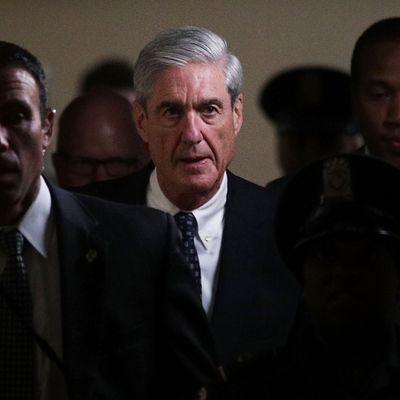
Two weeks ago, it looked like Robert Mueller’s job — and, arguably, the rule of law in the United States — was in serious jeopardy.
The New York Times and Washington Post had just confirmed that the special counsel was investigating the president for obstruction of justice — and exploring the possibility that Trump and/or his associates engaged in money laundering or other financial crimes with Russian officials as their co-conspirators.
Meanwhile, Trump’s confidantes had informed the press that he was thinking of treating Mueller to his signature catchphrase, and the White House’s leading sycophants had prepared several rationales for his firing.
And then, the president himself declared the investigation a “witch hunt” — one led by “very bad and conflicted people.”
Obstructing an investigation into charges that you obstructed an investigation isn’t a great look. And Trump’s previous attempt to fire his way out of the Russia story had done him no favors.
But it also hadn’t cost him any meaningful support from the only entity in a position to discipline him — the congressional Republican Party. So, it was entirely plausible that Trump would decide to test the GOP’s appetite for debasing itself and the republic — especially if he or his son-in-law had ever happened to dabble in a wee bit of money laundering.
Since then, however, Trump has avoided taking pot shots at Mueller. And now, the president is delaying his next counterattack on James Comey, as a gesture of goodwill toward the special counsel, according to Bloomberg:
Donald Trump’s lawyers will postpone filing a complaint against former FBI Director James Comey with the Justice Department, according to a person familiar with the decision – a bid to stop antagonizing the special counsel who’s investigating ties between the president’s campaign and Russian officials.
Trump’s lawyer, Marc Kasowitz, planned to file a complaint with the Justice Department’s inspector general about Comey. The ousted FBI director told the Senate on June 8 that he had arranged for memos he wrote documenting conversations with the president to be described to news reporters. Trump was furious about what he considered an illegal “leak” by Comey.
The president’s lawyers still intend to file a complaint at some point, the person familiar with the matter said. The person insisted on anonymity to discuss the president’s legal strategy. The delay is a professional courtesy to the special counsel, Robert Mueller, and a signal that the White House understands he needs space to do his job, the person said.
Former government officials routinely disclose the details of their interactions with presidents in memoirs and interviews. The information contained in Comey’s memos was not classified and virtually no legal experts believe the former FBI director was bound to silence by executive privilege. The only coherent legal argument against Comey’s actions, raised by law professor Jonathan Turley, is that Comey’s memos weren’t his personal property but official FBI documents, since he drafted them in the course of an investigation.
Under this theory, Comey would have been within his rights to describe the contents of the memos to reporters, but not to share the memos themselves. That he did the latter could put him in violation of professional ethics standards, but (probably) not criminal law, at least in Turley’s view.
Anyhow, the stakes of Trump’s complaint against Comey seem low. But the fact that the president now views antagonizing the special counsel as a bad thing is potentially significant.
Perhaps, this “witch hunt” will be allowed to run its course.






























